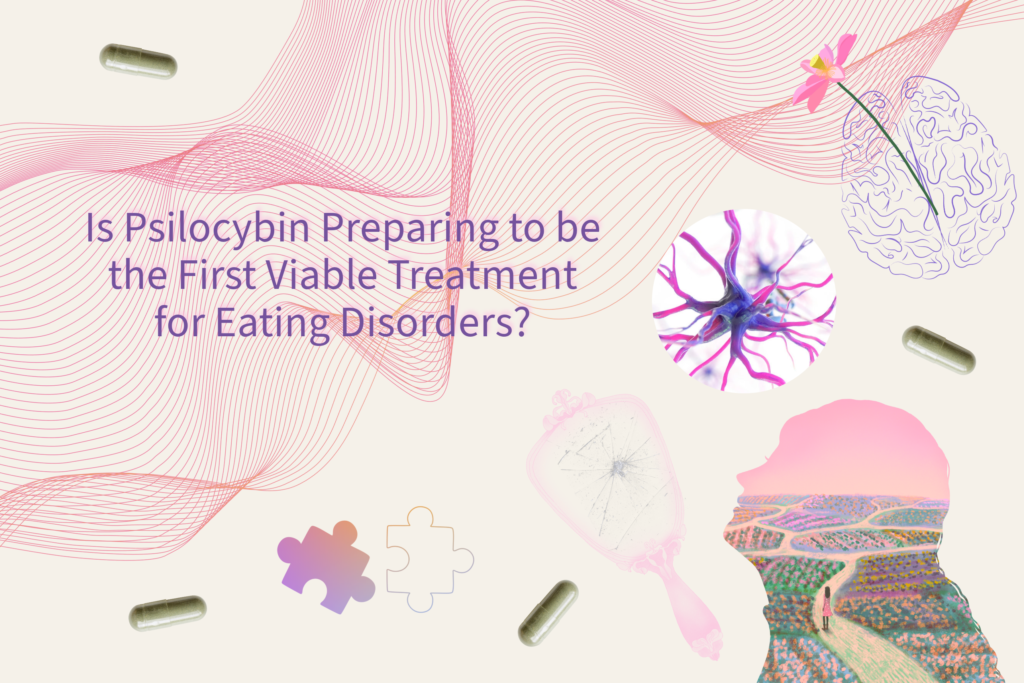As it currently stands, Anorexia Nervosa is a severe mental illness with one of the highest death rates of any mental health disorder, where a lack of treatment options contributes to its devastating mortality rate. Traditional psychotherapy is currently the only option for AN, with minimal success rates.
The need for novel, ‘unorthodox’ approaches is becoming more urgent — and psilocybin therapy is emerging as a front-runner in tackling the challenge.
Why Psilocybin is Being Considered
In all fairness, there is nothing “novel” about psilocybin-assisted therapy being used in the context of mental health. In actuality, research studies on psilocybin reached an all-time high in the last few years, with more and more experts venturing into new areas of mental health where psilocybin-assisted-therapy is expected to excel.
In 2024 alone, psilocybin therapy was explored as treatment options for treatment-resistant depression, OCD, cancer-related distress, and Alzheimer’s before the year’s conclusion. All of which noted psilocybin-assisted therapy similarly: a safe, considerable, sustainable integration for mental health treatment.
So how could psilocybin assist those with eating disorders? The answer lies in its consistent mechanisms: promoting neuroplasticity, enhancing neuropsychology, and its antidepressant and inflammation-regulating properties.
This brain rewiring, along with some still unexplained effects, has positioned psilocybin as a promising option for AN.
A 2024 study published in the International Journal of Eating Disorders focuses on the safety, efficacy, and tolerability of psilocybin as a treatment option for AN. In conclusion, the study found psilocybin to be a safe, tolerable, and acceptable treatment for the disorder.
Based on information we already have, there are several speculative mechanisms based on psilocybin’s broader effects, that may play a groundbreaking role in AN treatment:
Neuroplasticity: Psilocybin is known to promote neuroplasticity, meaning it can help the brain form new connections. This is particularly relevant for disorders like AN, where rigid thought patterns and behaviors—such as obsessive focus on body image and food—are core symptoms. Psilocybin’s unique ability to disrupt deep-seated cognitive patterns has been addressed in a handful of unrelated mental illness studies, and how it may yield the potential for new, healthier behaviors and beliefs to emerge.
Altered DMN (Default Mode Network) Activity: Psilocybin reduces activity in the brain’s default mode network, which is often hyperactive in individuals with mental health disorders. In AN, we can speculate that the DMN may be involved in self-referential thinking and negative body image, while in contrast, slowed DMN activity can reduce self-focused thoughts, which many individuals have experienced sustained psychological benefits from even once the psilocybin has worn off.
Reduced Fear Response: There is growing evidence that psilocybin can reduce fear response, which for individuals with AN, fear and anxiety surrounding weight gain and certain foods is a major obstacle. A study regarding PTSD published in the Chinese Medical Journal hypothesized that psilocybin could restore fear extinction (the process of unlearning fear) by increasing neuroplasticity in the hippocampus, which suggested promising results.
Beyond Symptom Reduction: What Separates Psilocybin From the Rest for Eating Disorder Treatment
While psilocybin’s biological effects like promoting neuroplasticity and slowing DMN activity are central to its potential as a treatment, the transformative experiences it elicits takes things beyond the neurochemical. One thing that is extra enticing in psilocybin research is the participant’s outcomes, often detailed as experiencing these mystical and/or spiritual experiences that leave profound shifts in their outlooks on life.
Statements like “existential bliss” or “profound transformation” in these contexts highlight the emotional release and catharsis felt during psilocybin-assisted therapy sessions, which seem to play a critical role in the patient’s long-term outcomes. In a study conducted by Griffiths et al. (2016), nearly 70% of participants who had been suffering end-of-life-distress as a result of a terminal illness diagnoses, rated their psilocybin sessions as one of the most meaningful experiences of their lives, with many reporting lasting improvements in well-being and quality of life. These positive outcomes persisted at the 6-month follow-up.
Anecdotal reports from small psilocybin trials have shown that patients often experience a sense of liberation from their fears, gaining new perspectives that allow for healthier, more balanced self-perception, which, in the context of Anorexia Nervosa, a rigid illness with little response to common treatments, might see a groundbreaking shift if and when psilocybin treatment becomes a more readily available option.
By helping AN patients reassess their body image and emotions in a more positive light, psilocybin therapy could do more than just address symptoms—it could be grounds for a new horizon where AN and other eating disorders are addressed at the root, encouraging long-lasting, existential healing.
While promising, psilocybin is still in the early stages of research, and for now, we wait.
In 2023, a small pilot study of just 10 participants was published in the journal Nature Medicine which also showed psilocybin-assisted therapy was a safe and considerable option for AN treatment. While this study was geared toward safety not efficacy, 40% of the women who had been suffering from AN experienced significant drops in their eating disorder behavior.
While these preliminary results are promising, these small studies focus on the safety and potential spectrum of side-effects associated with psilocybin-assisted therapy, rather than being efficacy-focused trials where more novel findings tend to occur.
While discussions of larger, efficacy-focused trials are underway, the timeline for such studies remains uncertain, largely due to the limited funding and infrastructure for psilocybin treatment centers. However, it’s often the small steps that lead to the biggest breakthroughs. What we have so far offers a glimpse of a new horizon in our understanding and treatment of eating disorders—a future where psilocybin may transform lives by addressing the deep-rooted cognitive and emotional challenges of anorexia nervosa.
Here’s to a hopeful future.



